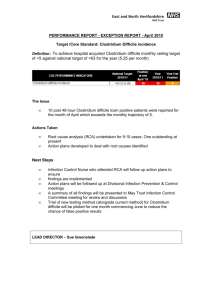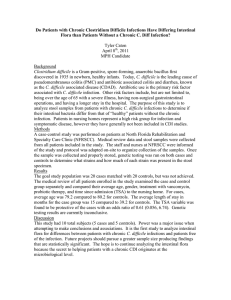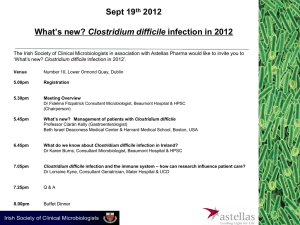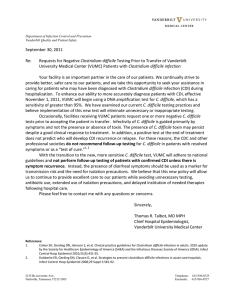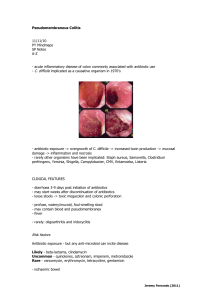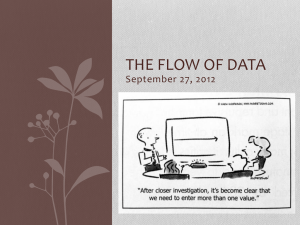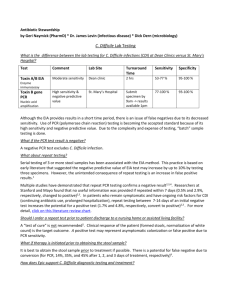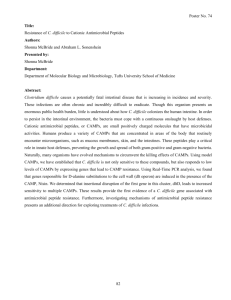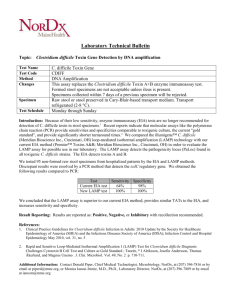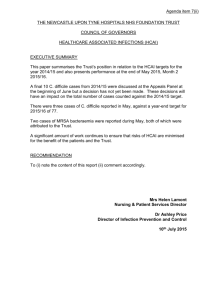C. difficile
advertisement
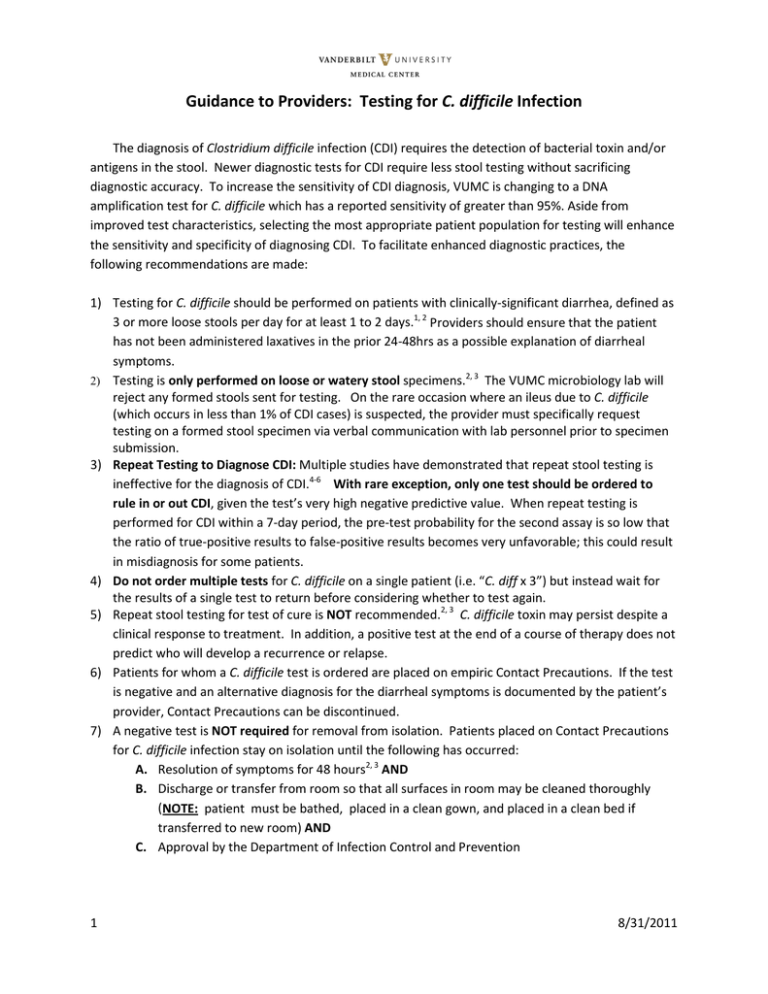
Guidance to Providers: Testing for C. difficile Infection The diagnosis of Clostridium difficile infection (CDI) requires the detection of bacterial toxin and/or antigens in the stool. Newer diagnostic tests for CDI require less stool testing without sacrificing diagnostic accuracy. To increase the sensitivity of CDI diagnosis, VUMC is changing to a DNA amplification test for C. difficile which has a reported sensitivity of greater than 95%. Aside from improved test characteristics, selecting the most appropriate patient population for testing will enhance the sensitivity and specificity of diagnosing CDI. To facilitate enhanced diagnostic practices, the following recommendations are made: 1) Testing for C. difficile should be performed on patients with clinically-significant diarrhea, defined as 3 or more loose stools per day for at least 1 to 2 days.1, 2 Providers should ensure that the patient has not been administered laxatives in the prior 24-48hrs as a possible explanation of diarrheal symptoms. 2, 3 2) Testing is only performed on loose or watery stool specimens. The VUMC microbiology lab will reject any formed stools sent for testing. On the rare occasion where an ileus due to C. difficile (which occurs in less than 1% of CDI cases) is suspected, the provider must specifically request testing on a formed stool specimen via verbal communication with lab personnel prior to specimen submission. 3) Repeat Testing to Diagnose CDI: Multiple studies have demonstrated that repeat stool testing is ineffective for the diagnosis of CDI.4-6 With rare exception, only one test should be ordered to rule in or out CDI, given the test’s very high negative predictive value. When repeat testing is performed for CDI within a 7-day period, the pre-test probability for the second assay is so low that the ratio of true-positive results to false-positive results becomes very unfavorable; this could result in misdiagnosis for some patients. 4) Do not order multiple tests for C. difficile on a single patient (i.e. “C. diff x 3”) but instead wait for the results of a single test to return before considering whether to test again. 5) Repeat stool testing for test of cure is NOT recommended.2, 3 C. difficile toxin may persist despite a clinical response to treatment. In addition, a positive test at the end of a course of therapy does not predict who will develop a recurrence or relapse. 6) Patients for whom a C. difficile test is ordered are placed on empiric Contact Precautions. If the test is negative and an alternative diagnosis for the diarrheal symptoms is documented by the patient’s provider, Contact Precautions can be discontinued. 7) A negative test is NOT required for removal from isolation. Patients placed on Contact Precautions for C. difficile infection stay on isolation until the following has occurred: A. Resolution of symptoms for 48 hours2, 3 AND B. Discharge or transfer from room so that all surfaces in room may be cleaned thoroughly (NOTE: patient must be bathed, placed in a clean gown, and placed in a clean bed if transferred to new room) AND C. Approval by the Department of Infection Control and Prevention 1 8/31/2011 8) Once a patient tests positive for C. difficile, the laboratory will not perform repeat testing for C. difficile for the subsequent 7 days. In addition, for patients who have not tested positive for CDI, only two (2) tests will be allowed per patient in a 7 day period. 9) External Transfer of C. difficile Infected Patients: On occasion, accepting facilities (e.g. nursing homes, rehabilitation centers) will request 1 or more negative stool tests for C. difficile prior to allowing transfer. As infectivity is guided primarily by the presence of symptoms, and many individuals with carriage of C. difficile are not at risk for transmission to other persons, such testing is not recommended.2 Case managers have been provided with a letter from VUMC leadership outlining our stance on this issue that will be distributed to facility leaders when follow-up C. difficile testing is requested. In addition, members of the VUMC Department of Infection Control and Prevention team are available to discuss such requests with the referring facility. Diagnostic Algorithm for C. difficile Infection: Patient with clinically-significant diarrhea (3 or more loose stools per day for at least 1 to 2 days)? NO Observe for 24 hrs to assess for persistence of symptoms. Do not order test for C. difficile. YES Has patient been taking laxatives over the past 24-48 hours? YES Stop laxative and gauge clinical response prior to ordering C. difficile testing. NO Enter order for a single stool specimen to be tested for C. difficile. Place patient on empiric Contact Precautions while awaiting results. C. difficile test results positive? NO Alternative diagnosis as cause of diarrheal symptoms made? YES Continue treatment and Contact Precautions. Do not send follow-up C. difficile test (i.e. as a test of cure) YES NO Stop Contact Precautions If C. difficile strongly suspected despite one negative test, a second test may be sent vs. empiric treatment for C. difficile infection. 2 8/31/2011 References: 1. Peterson LR, Robicsek A. Does my patient have Clostridium difficile infection? Annals of internal medicine 2009;151(3):176-9. 2. Cohen SH, Gerding DN, Johnson S, et al. Clinical practice guidelines for Clostridium difficile infection in adults: 2010 update by the Society for Healthcare Epidemiology of America (SHEA) and the Infectious Diseases Society of America (IDSA). Infect Control Hosp Epidemiol 2010;31(5):431-55. 3. Dubberke ER, Gerding DN, Classen D, et al. Strategies to prevent clostridium difficile infections in acute care hospitals. Infect Control Hosp Epidemiol 2008;29 Suppl 1:S81-92. 4. Aichinger E, Schleck CD, Harmsen WS, Nyre LM, Patel R. Nonutility of repeat laboratory testing for detection of Clostridium difficile by use of PCR or enzyme immunoassay. Journal of clinical microbiology 2008;46(11):3795-7. 5. Drees M, Snydman DR, O'Sullivan CE. Repeated enzyme immunoassays have limited utility in diagnosing Clostridium difficile. Eur J Clin Microbiol Infect Dis 2008;27(5):397-9. 6. Mohan SS, McDermott BP, Parchuri S, Cunha BA. Lack of value of repeat stool testing for Clostridium difficile toxin. The American journal of medicine 2006;119(4):356 e7-8. 3 8/31/2011
